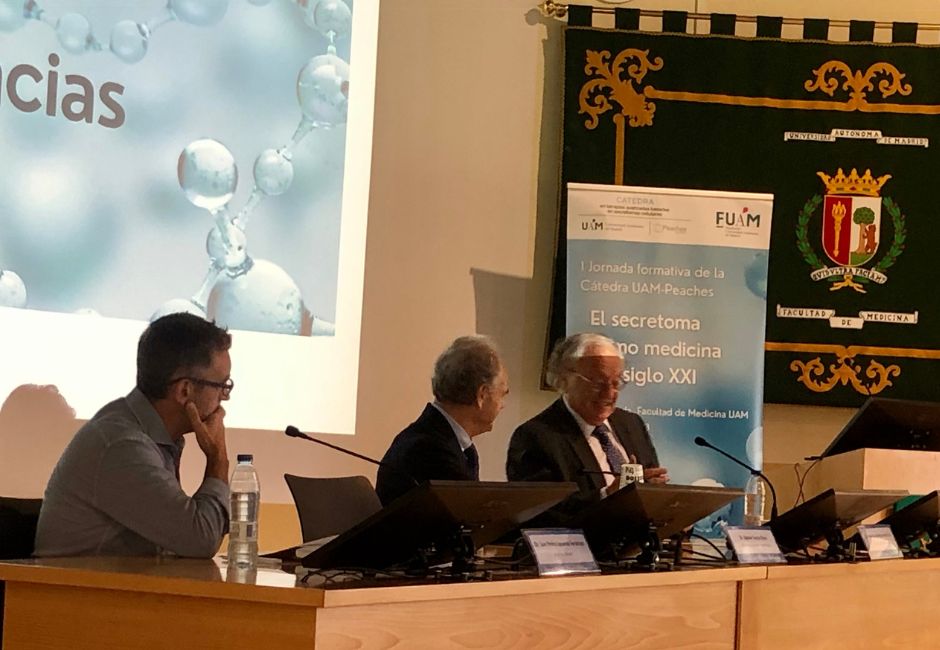FIRST CONFERENCE AUTONOMOUS UNIVERSITY OF MADRID AND PEACHES DEMONSTRATES THE SUCCESSFUL UNION OF OUR RESEARCH FORCES, THE ACADEMIC, UNIVERSIDAD AUTÓNOMA DE MADRID, AND THE INDUSTRY, PEACHES BIOTECH
– The UAM-PEACHES Chair in Cellular Therapies at the Autonomous University of Madrid (UAM) is holding its 1st Conference on the cellular secretome to highlight the potential of this pathway, the selective secretome, to explore new drugs for highly prevalent treatments.
– The selective secretomes is the basis that Peaches proposes as a new disruptive model for obtaining drugs that adds to the research carried out by the Department of Surgery of the Faculty of Medicine of the UAM in the field of advanced therapies.
Madrid,June 2023.-Under the title “The secretome as 21st century medicine”, the Autonomous University of Madrid and Peaches have launched an informative cycle that has highlighted the potential of the secretome as an approach for new treatments for highly prevalent pathologies.
The meeting was attended by the country’s leading experts in both clinical and regulatory areas. The therapeutic advantages of secretomes were highlighted and the regulatory field that needs to be established for their use and large-scale distribution was debated.
Throughout the day, valuable studies on the behaviour and function of selective secretomes were presented, opening the door to a new generation of biological drugs such as immunomodulators, anti-inflammatories and tissue regenerators that are currently lacking optimal treatment. In this field, Peaches has a patent on the selective secretome, called PRS, based on co-culture methods in which the communication between M2 macrophages and the different damaged tissue cells is reproduced.
The secretome represents the evolution of stem cell therapies. It is the language that stem cells use to regenerate damaged tissue. These cells identify their environment and form the appropriate commands for the tissue to initiate the regeneration process. These chemical messages are collected, isolated and would form a new biological drug.
In this first meeting of the UAM-PEACHES Chair, some of the advantages of secretomes over cell therapies were demonstrated. They are more stable than cells and can be kept cold at temperatures that are easier to handle. These are important elements for their use to reduce manufacturing costs, as they are much easier to use, distribute and transport as well as store, making them more accessible to doctors and, consequently, to patients.
“Cell communication is what we want to find out about with this UAM-PEACHES chair, or at least give a first glimpse of the language of the secretome, and thus try to reach the hospital and the clinic so that patients can benefit from this research,” says Dr. García Arranz, one of the directors of the chair.
Dr. García Olmo, also director of the Chair, states: “thanks to the creation of this Chair, a synergy between the University and the PEACHES company has arisen which, through the clinical researchers and the UAM, will promote progress and research into cell therapies”.
Using the language between the immune system and the cells of different tissues, Peaches’ research provides multiple therapeutic applications, such as immunomodulatory and anti-inflammatory drugs. Its PRS platform represents a step forward in advanced therapies and a new approach to regenerative medicine treatments, as well as to cytokine storms in response to infections.
In the words of the scientific director of Peaches, Dr. Pedro Lapuente: “we have put the cells to talk to each other and we have understood the language of the secretomes they emit. Now it is time to continue research into the clinical applications that knowledge of this cellular language can give us”.
The UAM-PEACHES Chair is directed by professors Damián García-Olmo and Mariano García Arranz, both with a proven track record in advanced cell therapy with stem cells.
The objective of this UAM-PEACHES Chair is to promote research and the dissemination of knowledge in the field of cell therapy and regenerative medicine, especially in the development of new advanced therapy treatments based on mesenchymal stem cells and the secretomes they emit to carry out their repair and regeneration work. This use of selective secretomes is the basis for a new model of drug delivery.
If you were unable to attend, here is the full conference (Spanish): secretome 21st century medicine

